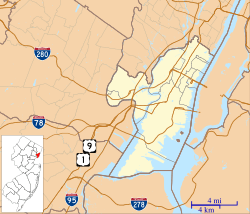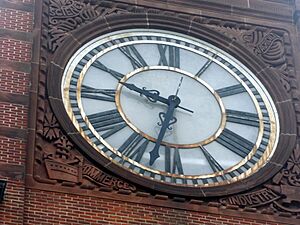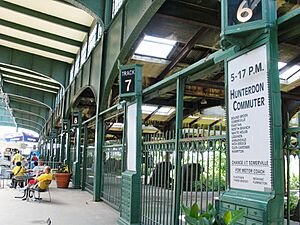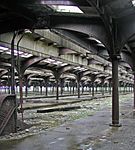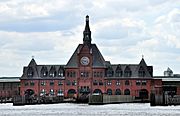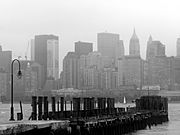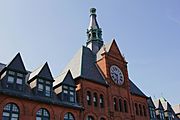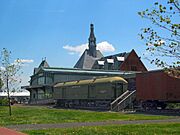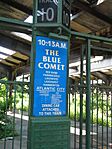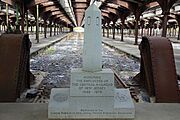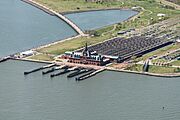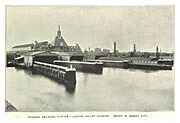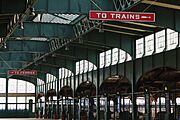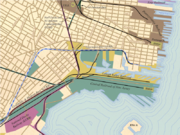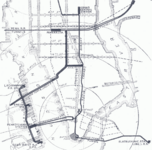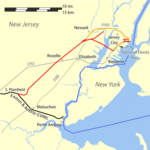Central Railroad of New Jersey Terminal facts for kids
Quick facts for kids
Communipaw Terminal
|
||
|---|---|---|
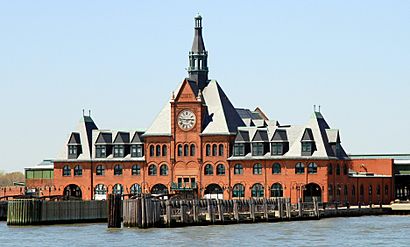
The Central Railroad of New Jersey Terminal at Liberty State Park in 2013
|
||
| Location | Liberty State Park Jersey City, New Jersey, U.S. |
|
| History | ||
| Closed | April 30, 1967 | |
| Electrified | No | |
| Former services | ||
| Lua error in Module:Adjacent_stations at line 236: Unknown line "Suburban service".
|
||
|
Central Railroad of New Jersey Terminal
|
||
| Location | Liberty State Park Jersey City, New Jersey |
|
| Area | 63 acres (25 ha) | |
| Built | 1889 | |
| Architect | William H. Peddle, Peabody & Stearns | |
| Architectural style | Richardsonian Romanesque | |
| NRHP reference No. | 75001138 | |
| Significant dates | ||
| Added to NRHP | September 12, 1975 | |
The Central Railroad of New Jersey Terminal, also known as Communipaw Terminal, was a very important train station in Jersey City, New Jersey. It was a major hub for passengers traveling by train and ferry. The terminal was built in 1889 and served millions of people until it closed on April 30, 1967.
This terminal was used by the Central Railroad of New Jersey, along with other big railroads like the Reading Railroad, the Baltimore and Ohio Railroad, and the Lehigh Valley Railroad. It was one of five large train stations along the Hudson Waterfront that helped connect New Jersey to New York City. Today, only the Hoboken Terminal is still used for trains.
The main building of the terminal has been restored and is now part of Liberty State Park. It is recognized as a historic site both in New Jersey and across the country.
Contents
A Look at the Historic Terminal
The terminal is located within Liberty State Park. It stands as a reminder of a time when many immigrants came to America. About 10.5 million immigrants who arrived at Ellis Island passed through this station. The area is called Communipaw, which means "big landing place" in the Lenape language.
The land where the terminal and its train yards were built was once underwater. It was "reclaimed" or filled in to create space. The terminal is also next to the Morris Canal, an old waterway that trains eventually replaced. The long road leading to the terminal is now named Audrey Zapp Drive, honoring an environmentalist who helped create the park.
The main building has a special design style called Richardsonian Romanesque. It had many platforms for trains and slips for ferries. Passengers could walk from the trains to the main waiting room or go directly to the ferries. The ferry slips have been fixed up, but the original building that covered them is gone. The large train sheds, built in 1914, are no longer there. These sheds once covered 12 platforms and 20 tracks.
Train and Ferry Services
How Trains Reached the Terminal
The terminal was one of several huge train complexes along the New York Harbor. These stations were vital for travel from the mid-1800s to the mid-1900s. To reach the waterfront, trains had to cross rivers and marshy areas. The Central Railroad of New Jersey built a bridge over Newark Bay to reach Elizabeth, New Jersey.
Today, parts of the old train routes in Hudson County are used by the Hudson Bergen Light Rail. This light rail system helps people travel around the area.
Ferries Connecting to New York City
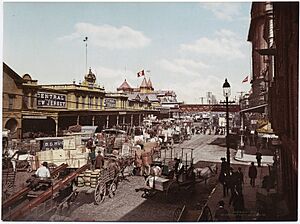
The main ferry route from the terminal crossed the Hudson River to Liberty Street Ferry Terminal in Manhattan. Four ferries regularly made this trip. There was also service to 23rd Street for a while. In the early 1900s, ferries also took passengers for the B&O Railroad's luxury service to Whitehall Terminal.
Other boats from the terminal traveled to places like Brooklyn and Staten Island, and even down to the Raritan Bayshore. In 1941, the ferries made 374 trips across the Hudson River every day!
Famous Train Routes
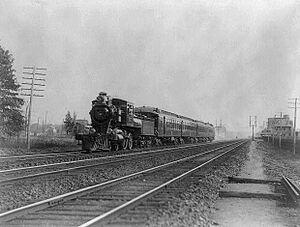
The Jersey Central's Blue Comet train offered special service to Atlantic City, New Jersey. Other trains went to towns west and south, including the Jersey Shore. Long-distance trains also traveled into Pennsylvania to cities like Harrisburg and Scranton.
The Reading Company used the terminal for its Crusader and Wall Street trains. The Baltimore and Ohio Railroad (B&O) ran its famous Royal Blue train to Washington, D.C.. They also offered train service to Chicago and St. Louis.
In April 1967, a new train connection called the Aldene Connection opened. This meant that all passenger trains were rerouted to Penn Station in Newark. This change led to the closing of the Communipaw Terminal for passenger service. Since then, Hoboken Terminal has been the main train station for Jersey City.
Special Passenger Trains
Many long-distance trains started their journeys at this station until April 1958. Trains to Philadelphia continued until 1967.
| Operators | Named trains | Destination | Year begun | Year discontinued |
|---|---|---|---|---|
| Baltimore and Ohio | Capitol Limited | Chicago via Washington, D.C. and Pittsburgh | 1923 | 1958* |
| Baltimore and Ohio | Columbian | Chicago via Washington, D.C. and Pittsburgh | 1931 | 1958* |
| Baltimore and Ohio | Diplomat | St. Louis via Washington, D.C. and Cincinnati | 1920s | 1958* |
| Baltimore and Ohio | Metropolitan Special | St. Louis via Washington, D.C. and Cincinnati | ca. 1920 | 1958* |
| Baltimore and Ohio | National Limited | St. Louis via Washington, D.C. and Cincinnati | 1925 | 1958* |
| Baltimore and Ohio | Royal Blue | Washington, D.C. | 1890 | 1958* |
| Baltimore and Ohio | Shenandoah | Chicago via Washington, D.C. and Pittsburgh | 1930s | 1958* |
| Baltimore and Ohio | Washington Night Express | Washington, D.C. | 1947 | 1952 |
| Central Railroad of New Jersey | Blue Comet | Atlantic City, New Jersey | 1929 | 1941 |
| Central Railroad of New Jersey | Bullet | Wilkes-Barre, Pennsylvania | 1929 | 1931 |
| Reading Railroad with the Central Railroad of New Jersey | Crusader | Philadelphia | 1937 | 1967 |
| Reading Railroad with the Central Railroad of New Jersey | Harrisburg Special | Harrisburg, Pennsylvania | 1910 | 1953 |
| Reading Railroad with the Central Railroad of New Jersey | Queen of the Valley | Harrisburg | 1902 | 1967 |
| Reading Railroad with the Central Railroad of New Jersey | Wall Street | Philadelphia | 1948 | 1968 |
| Reading Railroad with the Central Railroad of New Jersey | Williamsporter | Williamsport, Pennsylvania | 1931 | 1944 |
* In 1958, the Baltimore & Ohio Railroad stopped its passenger service north of Baltimore. This meant the Royal Blue train was discontinued, and other trains like the Capitol Limited ended their journeys earlier.
What Happened After the Trains Left?
After the terminal closed in 1967, it sat empty for a while. However, it was still looked after by the Central Railroad of New Jersey. When the nearby train repair shops closed in the early 1970s, the terminal was left abandoned.
The terminal has been used for many things since then. A part of the 1968 movie Funny Girl was filmed there. It also hosts many events like fairs and concerts. It's a popular spot to watch July 4 fireworks. After the September 11 attacks, its parking lot became a gathering place for ambulances helping victims.
Today, you can catch ferries from the terminal to the Statue of Liberty National Monument, Ellis Island, and Liberty Island. Since 2024, a free shuttle bus runs on weekends and holidays from April to November. This bus connects the terminal to other interesting spots in the park and to the Hudson Bergen Light Rail station.
The terminal was badly damaged by floods during Hurricane Sandy in 2012. But it was repaired and reopened in 2016. In 2020, a TV show called Fox & Friends even filmed an episode outside the terminal.
Gallery
-
A map of train lines approaching the Hudson waterfront from the south
See also
- National Register of Historic Places listings in Hudson County, New Jersey
- List of ferries across the Hudson River in New York City
- List of stations on the Central Railroad of New Jersey
- Central Railroad of New Jersey Freight Station
 | Audre Lorde |
 | John Berry Meachum |
 | Ferdinand Lee Barnett |


